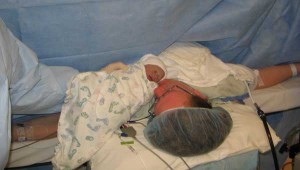Tips for Parents of NICU Babies (Although We Hope You Don’t Have to Use Them): Part 1

Kim and her baby boy.
This week on Fit Bottomed Mamas, we’re raising awareness of postpartum depression.
When you’re pregnant, you have visions of having a perfectly healthy baby and blowing the popsicle stand that is the hospital in just a couple of days. Unfortunately, not everybody gets that quick stay, and some babies land in the Neonatal Intensive Care Unit (NICU) until they get the green light to head home. Both of my kiddos landed in the NICU for six days. And while it was traumatizing the first time (landing me in the ER with a panic attack, yep), I was much better prepared the second time. With experience, I was just a lot more laid back about the whole thing.
I got an email not too long ago from a reader, Kim O., who shared her own story of preterm delivery and the subsequent emotional fallout. After problems with the placenta led to a 32-week, 5-day delivery, her 2-pound,15-ounce son earned a 50-day stay in the NICU. Here is her experience and tips for parents of babies in the NICU.
Life in the NICU
The first time I got to hold my son in the NICU…WOW. Talk about being overwhelmed. The noises, the tubes, the nurses, doctors, the respiratory therapists, the occupational and physical therapists—EVERYTHING was just very confusing to me and still feeling like I was in a “fog” didn’t help much. I was also pumping breast milk/colostrum (liquid gold in the NICU!) every three to four hours. The only thing I really remember about seeing and holding my son for the first time was thinking he was so small.
My son was on a CPAP (continuous positive airway pressure) due to his lungs being so immature, even after I had the steroid shot to try to mature his lungs quickly. He had apnea (where due to his prematurity he forgot to breathe) and bradycardia (where your heart slows down from you not breathing), also called As and Bs. He also had jaundice, an excess of bilirubin in the blood, which is common in preemies.
Life in the NICU is a difficult one to get use to. I still remember all the beeps of the machines and freaking out whenever his screen or a machine would go off. Every nurse that we had told me to “pay attention to your child NOT the machines.” Way easier said than done (at least for me….).
Day 23 of the NICU stay, my son had a GI infection (we didn’t know where he came down with that), so we had to start an IV again for antibiotics. Day 24 my son went NPO (nothing by mouth) and started a PICC line (a form of intravenous access that can be used for a prolonged period of time (e.g. for long chemotherapy regimens, extended antibiotic therapy or total parenteral nutrition) and started three antibiotics. During this time, there was a lot of blood work and then blood work also showed up as MRSA (a staph infection), which is very common in hospitals.
Day 43 of the NICU, the PICC line was removed! We worked really hard on breastfeeding. Suck, swallow, breathe. My son had a difficult time pacing himself. His weight was up and down at this time, so his doctor added extra calories to breast milk to help him gain weight.
The last few days in the NICU went really fast. Car seat check, PASSED! Eye exam, PASSED! Hearing screening, PASSED! Rooming in was very unexpected. I was so excited but very nervous at the same time! At the beginning all you want is a “normal” life, to snuggle your baby whenever you want and of course they are PERFECT. Life in the NICU hazes your idea of that. For me, life in the NICU was becoming the norm. What was I going to do without the machines telling me that he wasn’t breathing? What about the wonderful doctors and nurses? They took care of me as much as taking care of my son. But on Day 50, we were discharged!
Survival Tips for Families in the NICU
- Take care of yourself—adequate sleep and good nutrition.
- Try to get rest before your baby comes home.
- Take time for naps, baths, walks and lunch with a friend.
- Take one day at a time!
- Your baby will have good days and bad. Try to plan for both.
- Give yourself permission to take a day off! The next day may be easier.
- Your baby is working hard to become healthier and grow. Anticipate that some days your baby may need to “take the day off.”
- Be sure to ask your questions.
- Make sure you understand the answers you receive.
- Accept help when someone offers.
- Try not to do everything. Prioritize your needs.
- Nurses understand you won’t be able to be with your baby all the time.
- Mom and dad: Talk to each other. This can be a difficult time for both of you!
- Honor the time you can spend with your baby.
- Honor the time you spend caring for yourself and your family.
Stay tuned more on Kim’s life after the NICU stay and how she survived post-traumatic stress disorder. Do you have NICU experience? What tips would you add? —Erin
